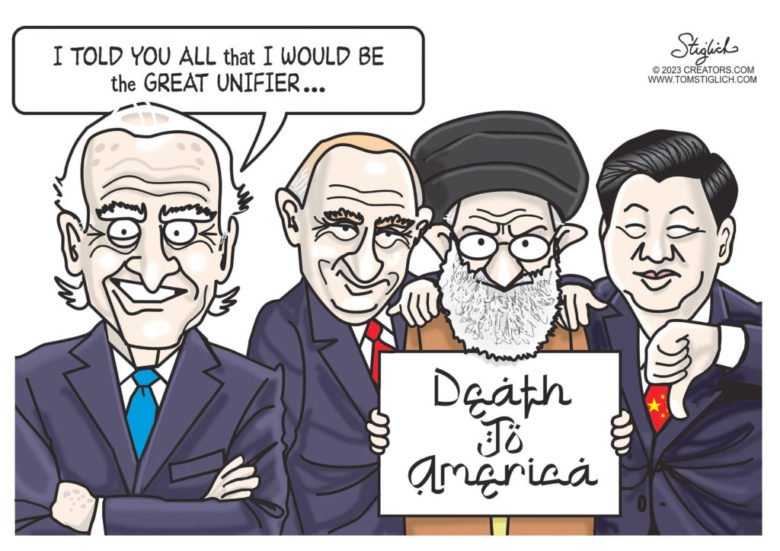Biden Admin’s ‘Ransom’ Payment Will Only Embolden Iran, Experts Say

- The Biden administration signed a deal last Friday to transfer $6 billion to Iran in exchange for five American prisoners.
- The deal is unlikely to persuade Iran to make compromises on other goals the U.S. has worked towards, such as restarting the Iran nuclear deal, according to foreign policy experts who spoke to the Daily Caller News Foundation.
- Additionally, Iran and other foreign adversaries could become emboldened to take more American hostages in the hopes of future “ransom” payments, foreign policy experts and 2024 presidential hopefuls said.
The Biden administration’s $6 billion transfer to Iran in exchange for five American prisoners will likely fail to produce concessions from Tehran, and may further embolden the country against the United States, foreign policy experts told the Daily Caller News Foundation.
The exchange deal is unlikely to persuade Iran to make other compromises, such as restarting the nuclear de-escalation program that was signed in 2015 and has since evolved under the Biden administration, according to foreign policy experts. Additionally, the deal could encourage Iran to take more American citizens hostage in the hopes of securing future “ransom” payments, the experts said.
“Despite earlier attestations by the Biden administration that hostage diplomacy and nuclear diplomacy are separate tracks, it’s clear that the administration sees one as the precursor for the other,” Benham Ben Taleblu, senior researcher on Iranian security and political issues at the Foundation for Defense of Democracies, said to the DCNF. “The administration will be trading away Iranian prisoners – likely legally prosecuted sanctions violators – and making potentially upwards of 6 billion dollars of frozen Iranian funds available for allegedly humanitarian transactions.”
“But thinking that this will generate goodwill to get Iran to meaningfully curb or end its nuclear program is a fool’s errand, as Tehran has a habit of pocketing concessions and turning the dial back up, on both nuclear escalation and hostage-taking, when needed,” Taleblu said.
The Biden administration has been in talks with Tehran to restart the Joint Comprehensive Plan Of Action (JCPOA) – informally known as the Iran nuclear deal – that was signed in 2015 by the Obama administration. The deal was scrapped in 2018 by former President Donald Trump for containing too many exemptions and a “sunset clause” that would have allowed Iran to resume its nuclear program in 2025.
The Trump administration then installed severe economic sanctions against Iran in an attempt to coerce the country into signing a stricter nuclear agreement, which was unsuccessful.
#Iran #IRGC and leader papers mock #usa: “We have an agreement without paying anything”; “Releasing 6 bln Dollars without a nuclear deal or FATF” pic.twitter.com/cPAa5fEwWk
— BenSabti (@BeniSabti) August 12, 2023
Since the deal’s nullification, Iran has restarted its nuclear program and has now obtained enough nuclear-weapons-grade uranium to build two nuclear weapons. The Biden administration began efforts to return Iran to the deal in 2021, but Iranian leadership has been largely uninterested and refused multiple proposals, leading the administration to come up with new proposals that ease some of the stricter aspects of the deal and waives certain nuclear sanctions.
No current deal has been accepted by Tehran, despite continued efforts by the Biden administration to find compromise.
“It’s also clear from Biden’s shifting redlines and goals with respect to Iran’s nuclear program – moving from a longer and stronger deal, to clean JCPOA resurrection, to a lesser deal, to merely an informal unwritten understanding – that the administration is looking for as little oversight as possible on the entire process,” Taleblu said.
The Biden administration’s exchange agreement could have been the latest attempt to persuade Iran into rejoining the nuclear deal, but Iran will likely view the agreement as a concessionary move by the U.S. and will have “no reason” to make concessions itself, according to Shoshana Bryen, senior director of the Jewish Policy Center.
“The Iranians did not agree to de-escalate the program in order to get the Biden administration to release the frozen funds. Therefore, there is no reason to think they will do it after the money is released. They cheated on every agreement with the U.S., the UN and the [International Atomic Energy Agency (IAEA)] since 2002,” Bryen told the DCNF. “Iran has no reason to think it should change its behavior — it is getting paid for nothing.”
Iran and other foreign nations are likely to see the Biden administration’s $6 billion transfer as evidence that the U.S. is willing to pay “ransom” to its adversaries in exchange for American hostages, increasing the likelihood that more hostages will be captured, according to Taleblu and Bryen.
“This is a…
Read More: Biden Admin’s ‘Ransom’ Payment Will Only Embolden Iran, Experts Say

